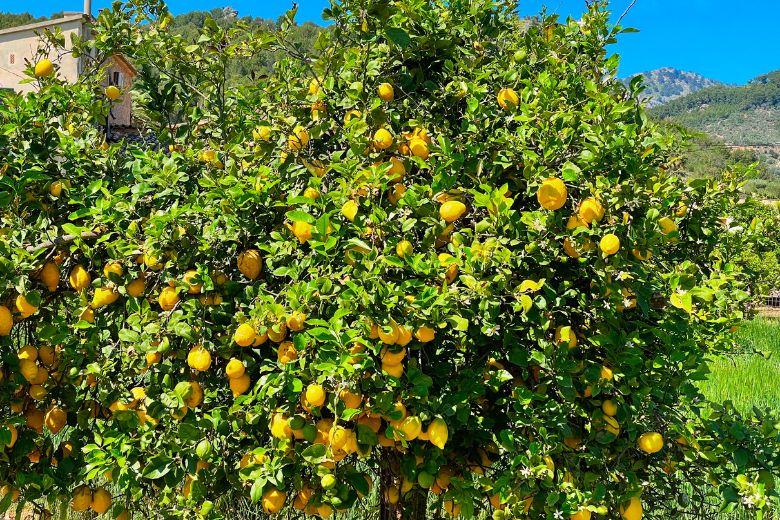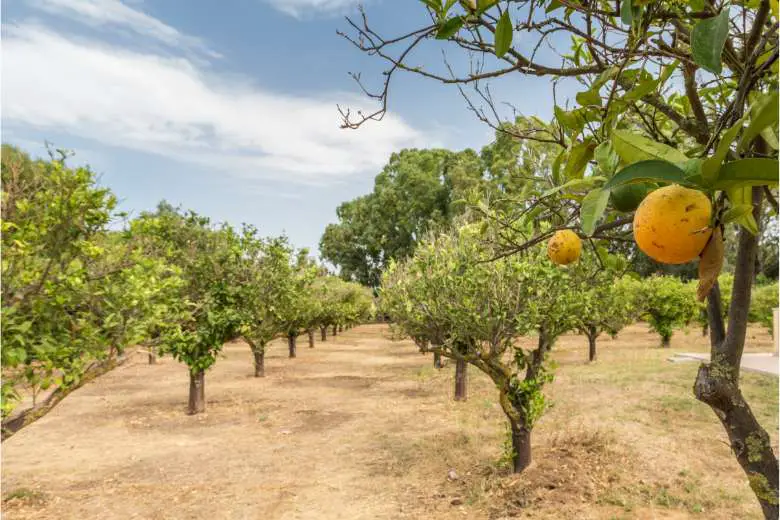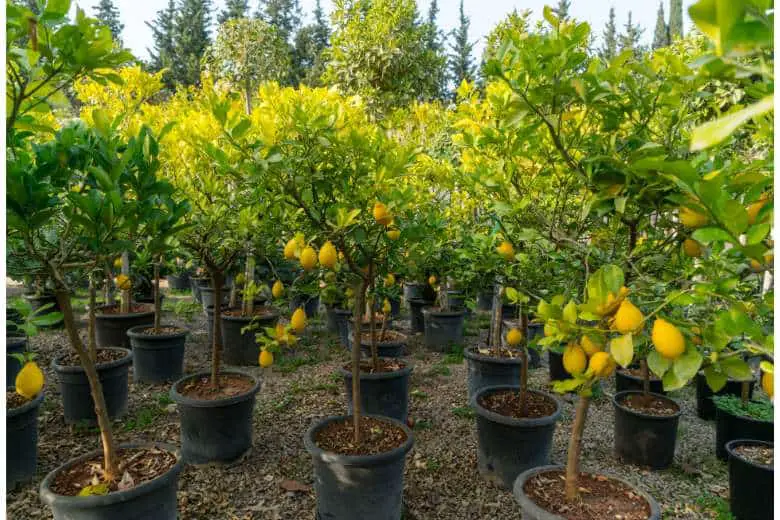
Many gardeners wonder if it is possible to grow lemon trees—with their bright yellow fruit and evergreen foliage—in the colder climate of Michigan. While the Mitten State experiences harsh winters that can dip below freezing for months on end, the right lemon varieties, growing methods, and protection strategies make it achievable to grow these tropical citrus trees successfully.
In this article, we have covered everything Michigan gardeners need to know to answer the question: can lemon trees grow in Michigan?
You will explore the optimal lemon varieties, Proper container growing and winter protection techniques, and so on.
By following the tips in this guide, even gardeners in the far northern state of Michigan can enjoy the delight of biting into a sun-ripened homegrown lemon. So, read on to learn if you, too, can cultivate citrus in your Mitten State garden and make “Can lemon trees grow in Michigan?” a definitive yes!
Climate Requirements of Lemon Trees

Before deciding if lemon trees can handle Michigan’s climate, it’s important to understand the ideal growing conditions lemon trees prefer. In their natural habitat, lemon trees grow in a tropical or subtropical climate.
They need warm weather year-round, with daytime temperatures between 65-80°F and nighttime temperatures no lower than 50°F.
Lemon trees also require a certain amount of chill hours each winter, between 0-300 hours below 50°F, to set flower buds and produce a crop the following year.
Too few chill hours may result in fewer or no lemons. Additionally, lemon trees need at least 10 hours of direct sunlight daily to thrive and produce fruit. They also need very well-draining soil.
With Michigan’s freezing winter temperatures that regularly drop below 20°F and cold and snow for months on end, lemon trees would not survive these conditions if grown outdoors year-round. The climate is simply too cold for their tropical requirements to be met without protection. However, with the right variety selection and winter protection strategies, it is possible for Michigan gardeners to grow lemon trees.
Suitable Lemon Tree Varieties for Michigan
Not all lemon varieties will succeed in Michigan’s climate. When choosing a variety, select one developed to withstand cooler winter lows better than traditional types. Some good options to consider include:
- Eureka Lemons: A very cold-hardy variety capable of tolerating brief temperatures down to 15-20°F. Considered one of the hardiest lemon varieties.
- Lisbon Lemons: Similar hardiness to Eureka, with a tolerance to 15-25°F. Produces fruit a few weeks earlier than Eureka.
- Meyer Lemons: Even harder than Eureka, able to tolerate brief lows of 10-15°F. Has a milder, sweeter flavor than other lemons.
- Variegated Pink Lemons: Can withstand temperatures as low as 10°F. Attractive variegated green and pink foliage.
No matter the variety, hardiness alone may not be enough to survive Michigan winters. Additional winter protection methods will still be needed for any lemon tree.
How to Plant Lemon Tree in Michigan

Here are the detailed steps for how to plant a lemon tree in Michigan:
Step 1: Choose a Lemon Variety
Select a cold-hardy variety like Meyer, Eureka, or Lisbon lemons, best suited for Michigan’s climate.
Step 2: Prepare the Planting Container
Use a heavy plastic or terracotta pot that is at least 20 gallons in size. Drill drainage holes in the bottom if needed. Fill the container 3/4 full with a well-draining citrus potting mix.
Step 3: Purchase a Young Lemon Tree
Look for a 1-2-year-old tree from a nursery, 6-12 inches tall. Avoid trees in flower to direct energy to root growth.
Step 4: Prepare the Root Ball
Gently remove any decorative wrapping or mesh from the root ball. Prune off any damaged or diseased roots with clean pruners.
Step 5: Water the Tree
Thoroughly water the root ball and allow the excess to drain. This prepares the soil for planting.
Step 6: Plant the Tree
Place the tree in the center of the container. Make sure the graft union where roots meet trunk is above soil level.
Step 7: Backfill with Soil
Add additional potting mix around the root ball until the container is 3/4 full. Gently firm the soil.
Step 8: Water Again
Lightly water the soil until fully hydrated, allowing excess to drain.
Step 9: Add Mulch
Top dress the soil with 2-3 inches of mulch-like orchid bark to retain moisture.
Step 10: Transplant Shock Prevention
Place the tree in partial shade and keep the soil consistently moist for 4 weeks as it recovers.
Step 11: Hardening Off and Moving Outside
Slowly acclimate the tree to more sunlight over 7-10 days. Move outdoors after the danger of frost passes.
Step 12: Ongoing Care
Monitor watering, fertilizing, training, and winter protection to keep your lemon tree happy in Michigan!
Note:
While some gardeners may choose to plant lemon trees directly in the ground with mulch protection, growing in containers provides the ultimate flexibility for overwintering. Using large containers, at least 20 gallons in size, allows the trees to be moved easily as needed for protection.
Some tips for growing lemon trees successfully in containers:
- Use a fast-draining potting mix specifically for citrus trees. Amend with compost or perlite if needed.
- Place containers in partial shade during peak summer heat to prevent moisture loss and sunburn.
- Fertilize monthly during the growing season with a balanced citrus fertilizer according to label directions.
- Water deeply whenever the top few inches of soil are dry, allowing excess to drain away.
- Repot into a slightly larger container if roots start circling at the edges of the pot.
- Bring indoors before the first frost or place in a cold frame for winter. Water sparingly.
With the right variety selection, container growing provides Michigan gardeners a very enjoyable way to raise productive lemon trees year after year with reliable fruit production. Following best gardening practices ensures long-term success.
Potential Challenges and Solutions for Growing Lemon Trees in Michigan
Growing lemon trees in Michigan presents several challenges due to the state’s northern climate, which is not naturally suited to citrus cultivation. Nevertheless, it is still possible to grow these trees successfully, often indoors, with the appropriate care. Here are some potential challenges and solutions:
1. Challenge: Cold Weather
In Michigan, winter temperatures often fall below freezing, which is a problem for lemon trees that thrive in more moderate, subtropical climates.
Solution:
One solution is to grow lemon trees in pots, which can be moved indoors during the colder months. Choose a variety like the Improved Meyer Lemon, which is known for being more cold-tolerant and performs well in pots.
2. Challenge: Insufficient Light
Lemon trees require a lot of sunlight – ideally, at least 10-12 hours a day. In Michigan, this can be difficult to achieve, especially in winter when daylight hours are reduced.
Solution:
If you’re growing your lemon tree indoors, place it near a south-facing window where it can get the most sunlight. You can supplement natural light with grow lights if necessary.
3. Challenge: Dry Indoor Air
Michigan winters can be extremely dry, especially indoors, with central heating systems running. Lemon trees prefer humidity levels around 50% or higher.
Solution:
Regularly mist your lemon tree or use a humidifier in the room where the tree is located. Placing the pot on a tray filled with pebbles and a little water can also help increase humidity.
4. Challenge: Poor Soil Drainage
Lemon trees need well-drained soil to prevent root rot. Some soils in Michigan are heavy in clay, which retains too much water.
Solution:
Use a well-draining potting mix specifically designed for citrus or succulent plants. If planting outside, consider raised beds or berming soil to improve drainage.
5. Challenge: Pest Infestations
Indoor and outdoor lemon trees can suffer from pests such as aphids, spider mites, and scale insects.
Solution:
Inspect your tree regularly for signs of pests. Use a soft cloth to wipe off any pests you find, or use a mild insecticidal soap or neem oil spray. Be sure to isolate any infected plants to prevent the pests from spreading.
6. Challenge: Nutrient Deficiency
Lemon trees need a variety of nutrients to thrive, including nitrogen, potassium, and phosphorus. They may not get these nutrients from the soil in Michigan.
Solution:
Fertilize your lemon tree regularly with a citrus-specific fertilizer, which will have the right balance of nutrients. Always follow the manufacturer’s instructions for dosage and frequency.
Although growing lemon trees in Michigan can be challenging due to the climate, with the right care and strategies, it is certainly possible. Remember to provide ample light, protect the tree from cold temperatures, maintain humidity levels, ensure good soil drainage, monitor for pests, and supply the necessary nutrients.
Pests and Diseases to Be Aware of
While citrus trees tend to be relatively pest and disease-free, a few common issues can potentially affect lemon trees in Michigan’s climate:
- Citrus Canker: A bacterial disease causing lesions on leaves and fruit. Avoid overhead watering and remove infected parts.
- Mealybugs: Sap-sucking insects clustered at branch joints. Use horticultural oil sprays as needed for control.
- Scale: Armored insects that attach and feed on branches. Carefully scrape or spray off with horticultural oil in dormancy.
- Aphids: Soft-bodied sucking pests that congregate on new growth. Knock off with a jet of water or use insecticidal soap.
- Cold Damage: Browning or dieback of foliage or branches due to extreme winter cold. Prune away dead parts in spring to maintain shape.
Scouting trees regularly helps catch potential issues early before they spread. Following sanitation and cultural practices is key to minimizing pests and diseases on container-grown lemon trees. Consult your local extension for organic treatment options as needed.
Conclusion
With the right choices in lemon tree variety, winter protection strategies, container growing practices and pest management, it is indeed possible for lemon trees to thrive when grown in Michigan. While they require more care than in warmer climates, it is well worth the effort for home gardeners to enjoy beautiful ornamental trees and tasty homegrown Meyer or Eureka lemons. Experimenting with one or two trees to see what works best for individual growing conditions is encouraged. With persistence, lemon trees can add a delightful splash of the tropics to just about any Michigan garden.








2 Comments